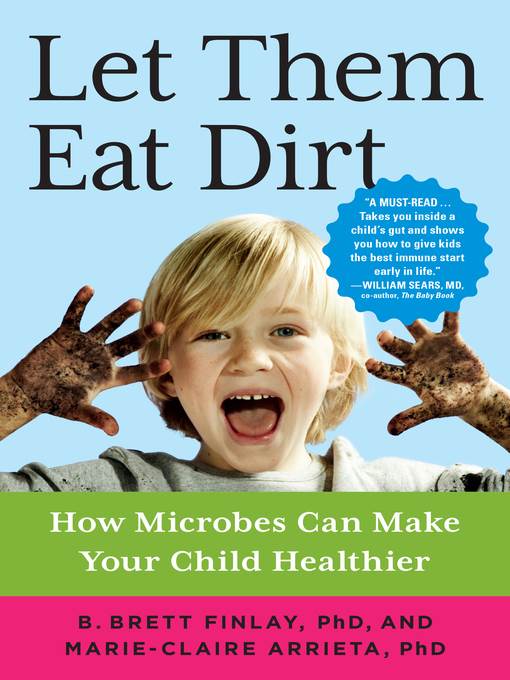
Let Them Eat Dirt
How Microbes Can Make Your Child Healthier
فرمت کتاب
ebook
تاریخ انتشار
2016
نویسنده
Marie-Claire Arrietaناشر
Algonquin Booksشابک
9781616206710
کتاب های مرتبط
- اطلاعات
- نقد و بررسی
- دیدگاه کاربران
نقد و بررسی

July 4, 2016
Microbiologists Finlay and Arrieta explain, in illuminating detail, the importance of the gut microbiome and, in particular, how supporting its diversity before birth and in the first months of life can benefit the immune system, allergy avoidance, and lifelong health. They urge reduction of the routine use of antibiotics and discourage use of antimicrobial soaps and sterilizers for baby bottles. They also affirm the value of bacteria-laden breast milk, supplementing formula with probiotics, being licked by puppies, and playing outside. Through these and other measures, they hope to restore the powerful benefits of microbe transfer from the environment to the young child, benefits lost as a side effect of efforts to reduce infectious disease risk and of cultural attitudes that conflate dirt with disease. Finlay and Arrieta’s strong pro-vaccine stance and willingness to admit that some claims are not yet fully established place them firmly in the medical mainstream. The focus on practical choices before and during birth makes this book a good resource for expectant parents; the information here is actually most useful well before the dirt-eating toddler stage. Agent: John Pearce and Chris Casuccio, Westwood Creative Artists.

June 1, 2016
Why dirt and microbes are good for your child.With the development of antibiotics, vaccines, and sterilization techniques, the world has seen a sharp decline in the spread of infectious diseases. However, Finlay (Microbiology/Univ. of British Columbia) and Arrieta provide ample evidence showing that our world of prescription antibiotics, antibacterial soaps, and hand sanitizers--all used to combat disease and encourage hypercleanliness--are also contributing to a steady increase in "diabetes, allergies, asthma, inflammatory bowel diseases (IBD), autoimmune diseases, autism, certain types of cancer, and even obesity." Beginning with pregnancy, the authors discuss the pros and cons of antibiotic use by mothers and how they change their microbial environment and can cause asthma, eczema, and hay fever in infants. Vaginal births deliver a multitude of beneficial microbes to the infant, and the authors suggest those who need caesarean sections consider a technique called "seeding," wherein the mother's vagina is swabbed to collect secretions that are wiped on the baby, the mother's chest, and nipples. This provides the infant with important beneficial microbes necessary for development after the near-sterile environment of the womb. Breast milk comes with its own set of microbes beneficial to the infant, helping the intestines mature sufficiently to handle the next stage of development: the introduction of solid foods. The authors discuss the advantages of having pets and the need for exposure to the wild outdoors. They give special attention to the links between antibiotics and the increase in obesity, diabetes, and inflammatory bowel diseases--in children and in adults. Short do's and don'ts lists help solidify the information. Overall, claim the authors, parents must be less hypervigilant about fighting bacteria, as many types of them are actually necessary for our children to be vigorous and strong. Solid, easily assimilated evidence showing how microbes are an integral part of a child's healthy life.
COPYRIGHT(2016) Kirkus Reviews, ALL RIGHTS RESERVED.

September 1, 2016
Scientists' knowledge and understanding of the human microbiota and the role it plays in our health and well-being has grown significantly in recent years. Microbiologists Finley and Arrieta, both of the University of British Columbia, condense the research into an accessible overview of the role of microbes in children's health, refuting the common belief that everything young children come into contact with should be sterilized and sanitized into submission. The development of the microbiota during birth and infancy is covered in detail, as key (and life-altering) differences in the microbiota of children have been found based on birth and dietary choices. Scientists are just beginning to understand the complex relationship between microbes and conditions such as diabetes, asthma, allergies, and obesity, and the authors describe cutting-edge research in the field, giving readers an idea of treatments that may be widely available in the near future. The book provides practical suggestions for parents hoping to encourage the development of a healthy microbiota in their children (hint: antibacterial soap does more harm than good, and the five-second rule can be expanded as needed).(Reprinted with permission of Booklist, copyright 2016, American Library Association.)

























دیدگاه کاربران